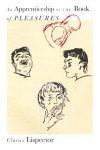Book Review :: An Apprenticeship by Clarice Lispector

Guest Post by Colm McKenna
Clarice Lispector’s An Apprenticeship or The Book of Pleasures is a romantic novel, but this categorization is perhaps misleading. The story follows primary school teacher Lóri falling in love for the first time. Lóri, however, does not feel sufficiently prepared; she cannot fall into it because she does not understand how to love, nor how to live. She strives to figure out the latter so that the former might come more easily.
Lóri is “cosmically different” from other people; the act of living that seemingly comes so easily to others is simply unintelligible to her. When engaging with the real world and its social conventions, she “put[s] someone else on top of herself” so that she can at least pretend to fit in. The scenes in which she interacts with the world are full of anxieties that are invisible to those around her. Lóri is full of metaphysical questions; she fears the prospect of shirking life, worries that the process of thinking is unnatural to her, and bemoans the epistemological loneliness that keeps people apart.
An Apprenticeship is unconventional as a romantic novel, which may explain the mixed reviews it initially received. However, there are some brilliant insights about love to be found here; Lóri makes a case for common sense in love, and the futility of a forced search for pleasure. Lispector’s novel is a richly philosophical story, as well as a sharp and original commentary on love.
Reviewer bio: Colm McKenna is a second-hand bookseller based in Paris. He has published and self-published an array of short stories and articles, hoping to eventually release a collection of stories. He is mainly interested in the works of John Cowper Powys, Claude Houghton and a range of Latin American writers.
An Apprenticeship or The Book of Pleasures by Clarice Lispector. Translated from the Portuguese by Stefan Tobler. New Directions Publishing, May 2022.




